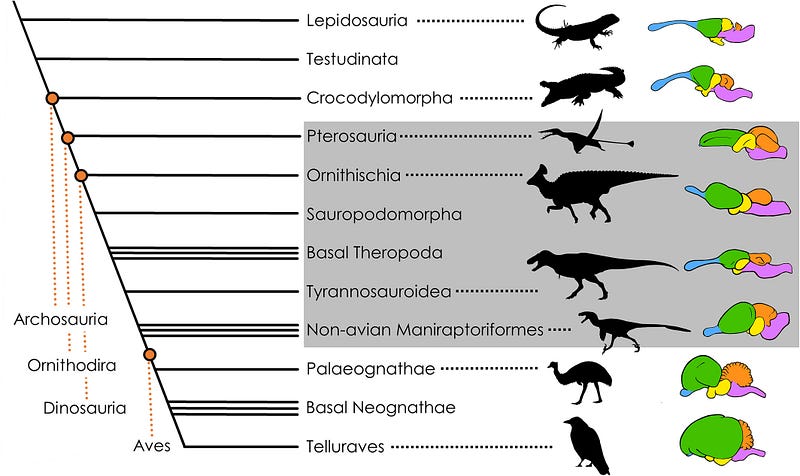The Intelligence Debate: Was T. rex as Smart as a Baboon?
Written on
Chapter 1: Understanding Dinosaur Behavior
The behavior of long-extinct giants has always piqued our curiosity. Among the questions that intrigue us most is whether the infamous T. rex exhibited intelligence comparable to that of modern primates.
Despite the thrill of discovering rare fossils that illuminate evolutionary history, paleontologists find even greater excitement in developing credible theories about extinct creatures' behaviors. The allure is intensified when the subject is a creature as captivating as the Tyrannosaurus rex.
Imagine stepping back into the Mesozoic era, surrounded by the roars of dinosaurs. Among these colossal beings, the T. rex reigns as one of the most formidable predators ever to walk the Earth. This scenario raises intriguing questions for any paleontologist or enthusiast: What level of intelligence did T. rex possess? Were they social creatures? Recent scientific studies have started to shed light on the cognitive capabilities of dinosaurs, focusing particularly on T. rex.
In a 2023 study, neuroscientist Suzana Herculano-Houzel from Vanderbilt University made waves in the paleontological community with a provocative assertion. Her findings, published in the Journal of Comparative Neurology, suggested that theropod dinosaurs, including T. rex, might have had intelligence levels akin to those of baboons, attributed to a high neuron count that could support intricate behaviors like tool usage.

Chapter 2: Challenging Conventional Wisdom
Not all scientists were quick to accept Herculano-Houzel’s conclusions. A collective of paleontologists, neuroanatomists, and cognitive psychologists, spearheaded by Dr. Caspar from the University of Düsseldorf, set out to rigorously examine the claims regarding T. rex’s cognitive abilities.
Their research, published in The Anatomical Record, involved a comprehensive re-evaluation of the methodologies used to estimate T. rex's brain size and neuron count. They uncovered significant flaws in the initial assumptions, leading to an inflated perception of the dinosaur's intelligence.
Contrary to Herculano-Houzel's assertions, the new findings indicate that T. rex and its theropod relatives exhibit intelligence more akin to that of modern reptiles, such as crocodiles and alligators, rather than primates. According to neurobiologist Doug Wylie from the University of Alberta, the brains of dinosaurs, similar to those of existing reptiles, do not completely occupy the skull cavity and are more loosely packed with neurons compared to those of mammals and birds.
The first video delves into the question of whether Tyrannosaurus rex was as intelligent as a baboon, exploring the complexities of dinosaur behavior and cognition.
In a broader context, this study extends beyond dispelling myths; it aims to illuminate the biological constraints that dictated the lifestyles of theropod dinosaurs. Herculano-Houzel’s hypothesis stemmed from the similarity in neuron density between some theropods and certain primates. However, the recent team argues that size differences must be considered. For instance, a male baboon, known for its intelligence, weighs between 14 to 40 kilograms and has a densely packed brain. In contrast, a T. rex could weigh around 7 tons, necessitating a similar neuron density not for advanced cognitive functions but rather to manage its vast body and essential survival activities.
To achieve higher cognitive functions, T. rex would need either a larger brain or a different architecture packed with more neurons. This correlation between neuron density and cognitive abilities is essential for assessing an animal's intellectual capacity.
The second video examines a new study claiming T. rex's intelligence levels were comparable to that of a baboon, discussing the implications for our understanding of dinosaur cognition.
The significance of these findings transcends mere academic debate. Our perception of dinosaur intelligence informs more than just cinematic narratives; it shapes our understanding of the evolution of intelligence across animal species and helps reconstruct ecological relationships within fossil ecosystems.

Additionally, this research underscores the value of interdisciplinary collaboration. By merging the insights of paleontologists familiar with dinosaur anatomy, neurobiologists knowledgeable in brain physiology, and cognitive psychologists who study behavior, we can achieve more credible scientific outcomes. Wylie noted that the project required extensive cooperation across various fields to effectively challenge established beliefs.
In conclusion, while the imaginative idea of a T. rex using tools and passing down knowledge may captivate our minds, current scientific evidence suggests a different reality. Theropod dinosaurs were undoubtedly successful in their ecological niches, dominating their environments for millions of years, but this success was likely not due to extraordinary cognitive abilities.
This discussion highlights the dynamic nature of scientific inquiry, where ideas are continually tested, debated, and refined. As new technologies and methodologies emerge, our comprehension of the fossil record will continue to evolve. Therefore, when you next encounter a T. rex exhibit in a museum, reflect not just on its formidable features, but also on the ongoing quest to unlock the mysteries contained within its fossilized remains and the context of its existence. This exploration extends beyond dinosaurs; it encompasses our pursuit of knowledge about the natural world.